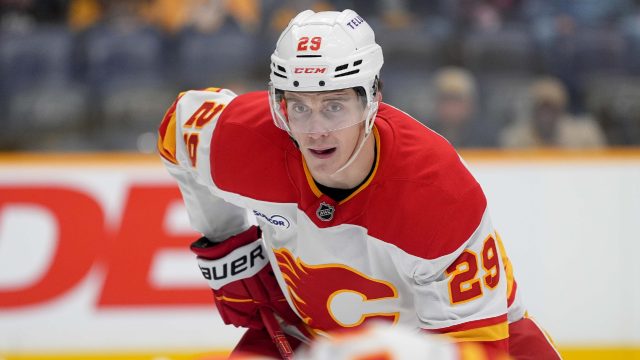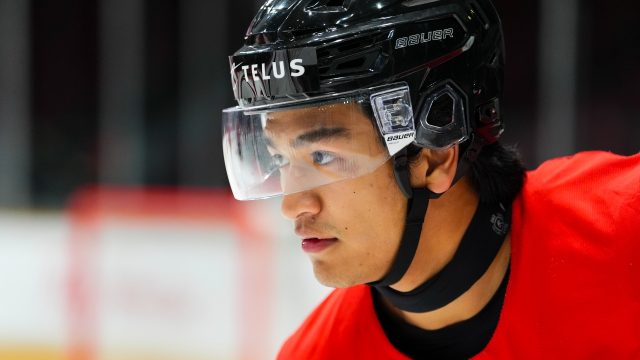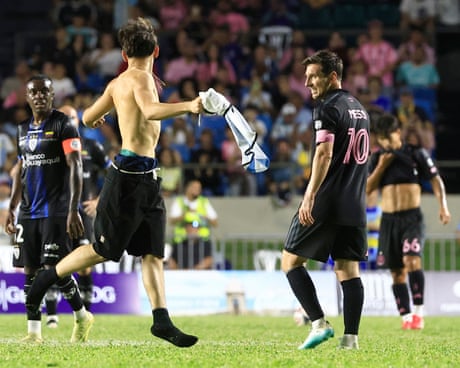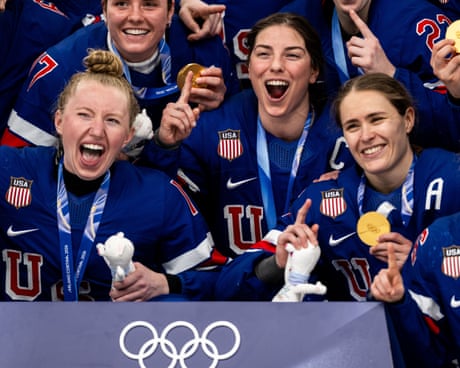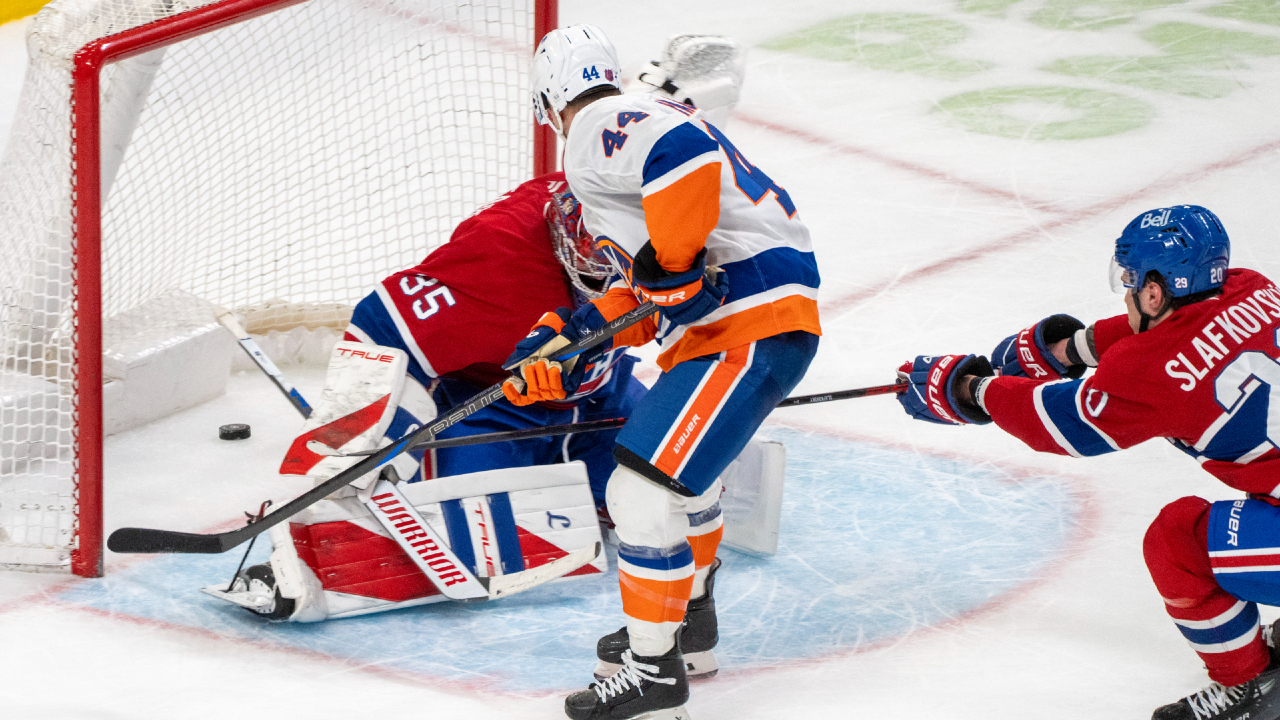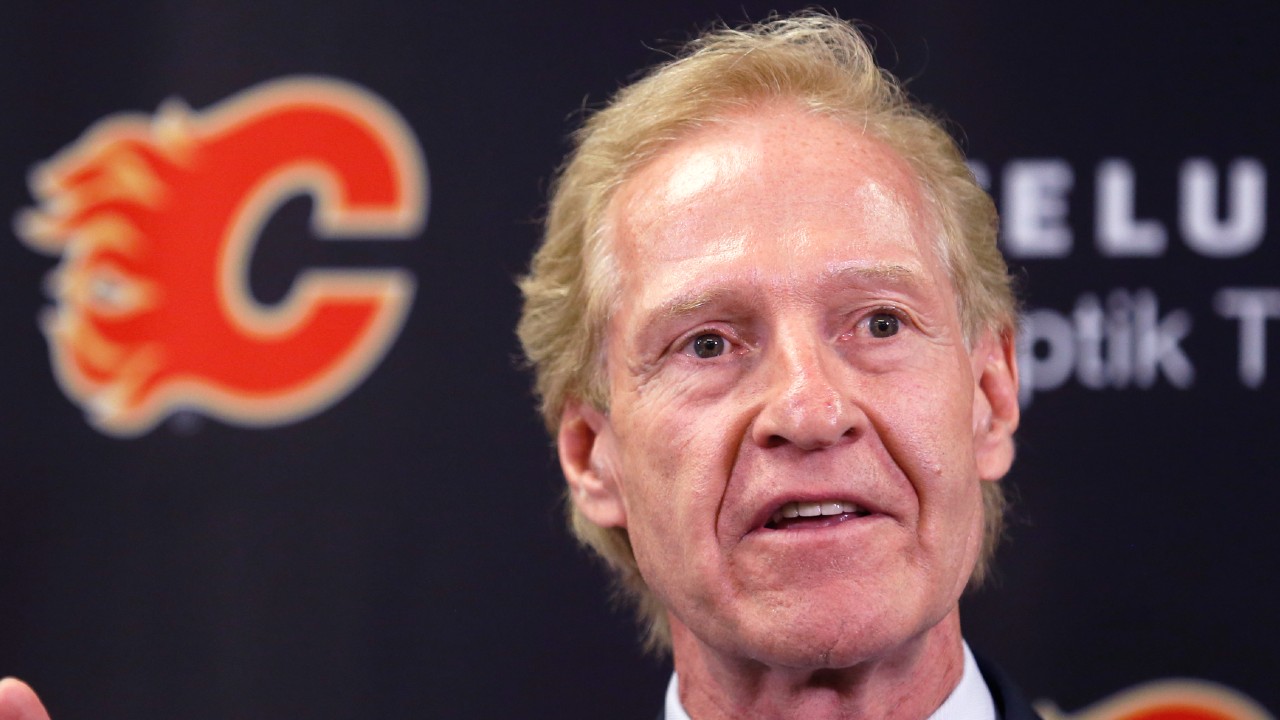
CALGARY — The Calgary Flames aren’t willing to throw in the towel, nor are they willing to contemplate the possibility of leaning into what many consider to be a lost season by tanking.
Even though only one team in the last 55 years has bounced back to reach the playoffs after being 10 points out through their first 22 games, Flames president of hockey operations Don Maloney says the club’s vision remains the same.
In a wide-ranging, 45-minute one-on-one, the man in charge of the last-place Flames said that while he sympathizes with fans clamouring for a rebuild, it won’t be happening on his watch.
“The only time you enjoy the first pick of the draft is at the draft — there’s a lot of suffering to get there, and that’s the farthest from our mind,” said Maloney.
“No one has an appetite to just burn it to the studs, take it all down.”
To many fans, Maloney’s stance will come across as tone deaf.
The bulk of Flames fans are fed up with striving to remain in the mushy middle, and are indeed clamouring for the organization to take a radically different approach with an eye on landing Gavin McKenna or Keaton Verhoeff at this summer’s draft.
“I feel for the fans, because I know the narrative out there is, ‘they should just blow this up — they’re not going anywhere. Why aren’t we playing these young kids? Just get rid of older guys, get young guys, get draft picks,’” said Maloney.
“If we could trade somebody and get a top-three pick or a premier prospect, there’s no restrictions on us making deals if the deal makes sense with our long-term plan. If (general manager Craig Conroy) got a call today for, whoever, and it was like, ‘wow, this is good for us long term’ then, of course.
“So, the idea that we’re digging our feet in the sand and saying no — we’re realistic where we’re at. We know we’ve got real things to sort out short term here, but we’re going to continue this process of drafting well, developing well, work at deals that make sense to us longer term. What the fans don’t get is that we have a team next year that we have to put on the ice, and what happens if some of these younger players aren’t quite ready? And then you’re, you know, you’re the 32nd place team next year.”
Again, that would be music to the ears of many frustrated Flames supporters.
In the first of a two-part Q&A with the rarely-quoted Maloney, he assesses the first quarter of the season, what’s gone wrong, and whether the organization’s approach moving forward could change.
In Part 2, Saturday, he discusses Nazem Kadri, Zayne Parekh, Rasmus Andersson, Matvei Gridin, coach Ryan Huska, and GM Craig Conroy.
Sportsnet: What is your assessment of the first quarter?
Don Maloney: It’s been poor, and unexpected. We need everybody playing a certain style to be competitive in this league. Basically, everything that could go wrong has gone wrong. We got off to a slow start, we got behind the eight ball. We can’t score. You don’t defend particularly well. When I look at the roster right now I have a hard time picking one player or two players that I can say, ‘this guy has played consistently, up to the identity.’ I think we’re realistic in our expectations, but we certainly think there’s more in this group than we’ve shown. But our record is the record. We’re 32nd in the league, and it’s very humbling. Everybody in the organization feels it.
SN: Same personnel as last year, same coaching staff, same everything, different result. Can you put your finger on why?
DM: No, quite frankly, I cannot. That’s all we’ve been doing for the last month, is evaluating everything we’ve done, from who we’ve signed and when we sign them, to how we’ve trained, to how we coach, and we haven’t found the ingredient, other than this lack of consistency. I think there’s a certain style that we need to play here right now, and it’s not pretty, per se. It’s playing a little tighter defence, less mistakes, smarter with the puck. And we haven’t been a particularly smart team either. You know, we’re one of the highest penalized teams in the league, and we have the most bench penalties. Why? It’s been the perfect storm that everything that could possibly happen has put us in this position. It’s still November. But if we’re sitting here in February and March, and we continue to flounder, obviously there will be changes.
SN: Has this start altered the organization’s approach moving forward?
DM: No, our message is the same.
SN: At some point, if the losing continues, could this season possibly alter the approach of the organization?
DM: I don’t think it would alter the long-term approach. We’re so conscious of the culture here, and creating the right environment to grow these players, and we feel it’s better to grow winning players in a winning environment. We’re still going to lean on our veterans, but leave the opportunity for some younger players to come in when they’re ready. I don’t think the overall approach is changing as we sit here Nov. 22.
SN: Is the narrative accurate that the directive from ownership is that there’s not going to be a reset or a rebuild?
DM: No, I don’t think that’s accurate. We have a collective group here with Dave Nonis, Craig, myself, Brad Pascall, Peter Hanlon and we discuss how we move forward. We all want to win a Cup. Yet we, there’s a dynamic in Canada, you have 82 games, you want to sell tickets and get people to come to your games. It all kind of works together. No one has an appetite to just burn it to the studs, take it all down. There’s examples out there right now where you’re talking potentially decades it can take to rebuild. The draft is such an inexact thing. If you could be guaranteed that you could get a superstar or franchise-level player every year I’m sure ownership of any team would say, ‘okay, yeah, we’ll suffer for two or three years.’ But we just don’t think that’s the way for us. We prefer a Dallas model, where they got Miro Heiskanen at three, but also got good players in the 20s, in the 30s. We’ve got to be better in our drafting and developing, versus saying, ‘let’s just lose easy for everybody.’ We don’t want that culture as part of this organization.
SN: With a top-heavy draft that includes Gavin McKenna, is it not enticing to simply lean into the hand you’ve been dealt early this year?
DM: In a fantasy world, yeah. Unfortunately, this isn’t fantasy hockey. There’s not even agreement anymore McKenna is going first. There’s very few franchise players in every draft. Regardless of where we pick — one, five, 10, our hope is that we get a top-level player, and that’s not our focus at all.
SN: Is there not a lesson to be learned by the fact that the top four leading scorers in the league now are all No. 1 picks overall, and teams like San Jose, Chicago, Anaheim and the Islanders have all turned around with their star draft picks leading the way?
DM: Again, in a fantasy world, it’s very enticing. You have to deal with the real world, too. First of all, we’re very early in this season. Let’s see how it plays out the rest of the year for those teams. No disrespect, those teams are really good, but on that side, look at some of the other teams that have been in this. I don’t want to say the teams, but they’ve been down and missed playoffs for years and years and years. And then you lose your fans, you lose your interest and nobody wants that.
SN: It seems like everyone would agree you’re missing the difference makers. How can you get them if you don’t draft one, two or three in the draft?
DM: Well, Matthew Tkachuk was a pretty big difference-maker and he was drafted sixth. There’s good players at the top of the draft. You don’t have to be at the very bottom to get difference makers. Your odds are probably better to be at the very bottom, as we all know, but for us, it’s one thing to have this discussion in March and April. It’s another to be talking in October, November. For a team like us who came in with certain expectations, we’re not going to just knee-jerk it because we’ve had a bad month. We’re going to continue to do what we’re doing, develop and draft our players the way we feel is the correct way to do it. We’ll see how the next few months go, but again, it’s not going to be a knee-jerk reaction to having just a very disappointing 20 games.
SN: I’m with you, nobody goes into a season saying, ‘I hope to finish top five.’ But, what about the notion that this poor start is an opportunity to pivot for the greater good?
DM: We’re still evaluating every day as we go along, and when we say ‘how do we improve the club?’ it’s always with a long-term point of view. To me, it’s just too early for us to be throwing in the towel. There’s never going to be a point where we’re going to say, ‘let’s just get rid of every player that other teams want.’
SN: When you say long-term, do you have a goal in mind in terms of when you expect this team to be competitive?
DM: In an ideal world. We’re hoping to have a little pop in momentum going into the new building. But again, it’s just how these young players evolve. If we had this conversation in summertime, we were probably feeling a little bit better about things. We’ve got some prospects here and some young players, but when you’re sitting where we’re sitting in the standings, it looks a little cloudy.
This interview was lightly edited for brevity.


